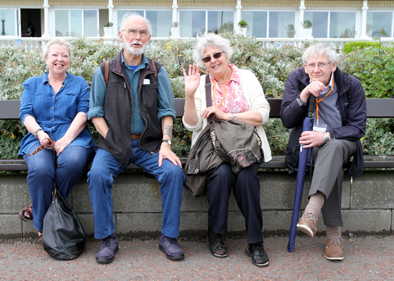First written 2014 and amended November 2017
Technology
is a lovely thing, if you can use it and understand it these days
Children
are growing up with various forms of technology these days, and although they
will adapt to newer forms of technology in the future, but I do wonder if they
will be able to function without it, when things go wrong
When we
go into supermarkets these days, we see modern technology at the checkouts, but
if there is a power failure, the store must close, because no one can add up
without the technology any more.
When I
was young, the store staff added up your bill, usually on the piece of paper
where it could be seen and checked, but those days have long gone
However,
these days many elderly people have never come across some of this technology,
and in many cases, they may not want to use it.
I confess
that I don't cope with the self-service checkouts very well, and tend to join
the big queues waiting to be served by real staff, rather than a machine
There are
so many possibilities for using technology to keep you occupied or active, but
I do worry that soon, it’s going to get beyond the control of many elderly
people, or those with a neurological illness.
I suppose
the day will come when doctors’ appointments could be done via Skype or
telephone or even email, rather than face to face, and this will cause problems
to those who don't cope with technology very well
These
days we are told to order our prescriptions, and arrange appointments over the
internet, however I get confused doing this, and my wife does not like it, so
we do it the old way by going to the doctor’s surgery.
Many elderly
people and those with living with dementia etc, are using technology at home to
keep themselves active, in the hope of staving off the illness for a little but
longer.
It does
worry me that technology is now being overused in many places, making it
difficult for elderly people and those with neurological illnesses to keep up
with constant changes.
Looking
constructively at technology, it's used so widely these days, that many people
don't always accept its use. Years ago, there were many complaints about
the use of technology to track people with dementia.
But in
all honestly, everyone who uses a mobile phone is tracked by a satellite,
so if you can use a mobile phone and be tracked, why is it so wrong to use it
to track people with dementia, because at the end of the day, it’s for our safety,
and is giving us the freedom to do whatever we want, without needing full
time carers with us.
This
gives us the freedom to do what we want, when we want, so we can live an active
life without social workers etc, or anyone else telling us what we can and
can't do.
But technology is far reaching these days, and some people would be totally lost without it.
But technology is far reaching these days, and some people would be totally lost without it.
I use
technology most days, whether it's my mobile phone, tablet computer, or whether
it's things like, the voice activated software on my computer, which is a great
help on my bad days, when it's difficult to use a computer key board.
This is a
godsend, but it has its down side, because there are days when it fails to
recognise my voice, so I must spend time going over the course again teaching
the equipment to understand what I am saying.
This is
often seen as part of Parkinson's disease which is like Lewy Body Dementia. The
tone of our voice changes on a regular basis
What does
annoy me, and I don't suppose I am alone, is the fact that companies keep
changing their websites, and this in turn makes life so much harder for those
of us, whose brain is doing its own thing.


